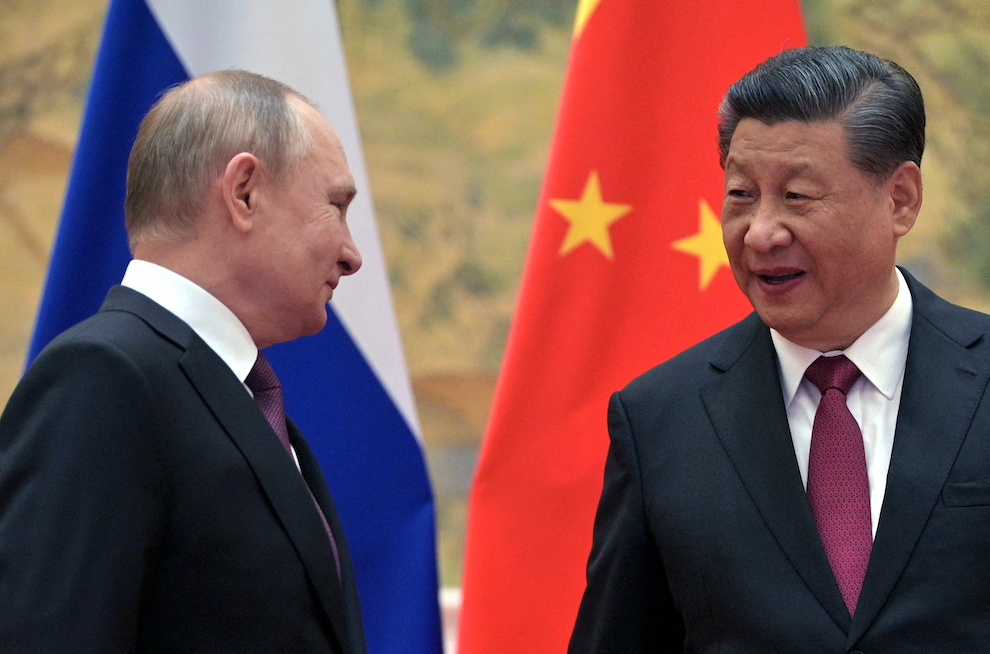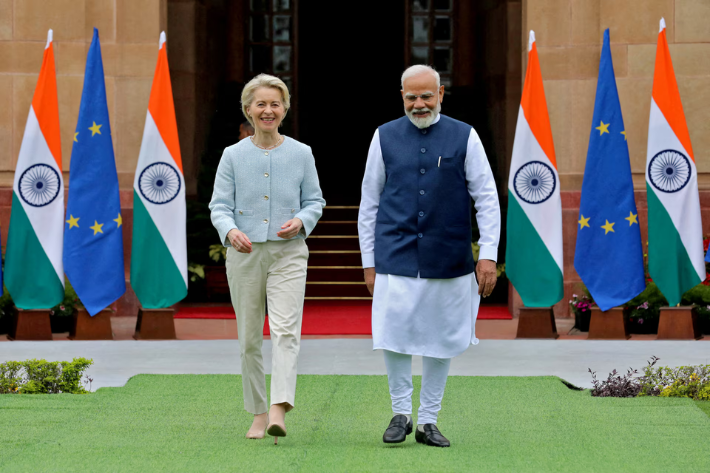Forget the Olympics – Friday was a day of heated geopolitical rhetoric by Asia’s two biggest authoritarian states, whose leaders met in Beijing and condemned the United States and its allies, while vowing to support each others’ core interests.
Russian President Vladimir Putin and Chinese counterpart Xi Jinping criticised what they said was the US’ negative influence on both in Europe and the Asia-Pacific region after a meeting ahead of the opening ceremony of the Winter Games. Both countries have faced increasing criticism from Washington.
A document agreed by Russia and China and released by the Kremlin said they “oppose the further expansion of NATO” and call on the US-led defence bloc to abandon its “Cold War era” approaches.
Talks between the Russian and Chinese leaders come as Moscow is in a diplomatic stand-off with the United States over Ukraine, demanding that NATO curb its eastwards expansion.
Russia said it wants NATO to guarantee that it will not admit new members, especially Ukraine, and that Washington will not establish new military bases in ex-Soviet countries.
In the document, Moscow and Beijing also criticised Washington’s “negative impact on peace and stability” in the Asia-Pacific.
It said they were “seriously concerned” by the AUKUS defence alliance including Australia, Britain and the United States, especially their cooperation on nuclear submarines.
“Russia and China believe that such actions are contrary to the tasks of ensuring the security and sustainable development” of the Asia-Pacific region and “increase the danger of the start of an arms race”.
The AUKUS partnership announced last September will see Canberra acquire nuclear-powered submarines using US technology, and sparked sharp criticism from Beijing.
Chinese President Xi Jinping said China and Russia would “resolutely” support each other in defending core interests and would deepen strategic coordination, state media reported on Friday after he met Putin.
Xi said Chinese-Russian strategic cooperation was “unshakable, past, present and future”.
‘Coordinated Positions’
The remarks came after a warning from the US that Chinese companies they would face consequences if they sought to evade any export controls imposed on Moscow in the event of Russia invading Ukraine.
State Department spokesman Ned Price made the remark after China’s Foreign Ministry said Beijing and Moscow had coordinated their positions on Ukraine.
“We have an array of tools that we can deploy if we see foreign companies, including those in China, doing their best to backfill US export control actions, to evade them, to get around them,” Price told a regular news briefing.
Western countries say any invasion of Ukraine by Russia would bring sanctions on Moscow and Washington has said it is prepared to impose financial sanctions as well as export-control measures.
The Kremlin said early on Friday that Washington could not be trusted after US officials claimed to have evidence of a planned operation by Moscow to film a fake Ukrainian attack on Russians.
“I would recommend not to believe anyone, and especially the State Department, when it comes to these issues,” Kremlin spokesman Dmitry Peskov told reporters.
The Pentagon said on Thursday it had evidence of a plan by Moscow to film a fake Ukrainian attack on Russians to justify an assault on its pro-West neighbour.
Neither the Pentagon nor State Department spokesman Ned Price, who also commented on the alleged plan, offered evidence to back up the claim.
Russian Foreign Minister Sergei Lavrov on Friday accused “Western colleagues” of making things up.
“The delusional nature of such fabrications – and there are more and more of them every day – is obvious to any more or less experienced political scientist,” he said in televised remarks.
In related news, German Chancellor Olaf Scholz will visit Kyiv on February 14, his spokesman said on Friday, a day before he holds talks with Russian President Vladimir Putin in Moscow amid soaring tensions with the West over Ukraine.
“In addition to (discussing) bilateral relations, the focus will also be on international issues, including security issues,” Scholz’s spokesman Wolfgang Buechner told reporters.
• Jim Pollard with AFP and Reuters
ALSO ON AF:
US Warns Chinese Companies Against Evading Russia Sanctions
Putin in LNG Deal with China as US Seeks Supply from Japan
























